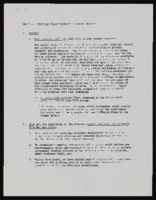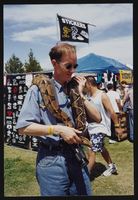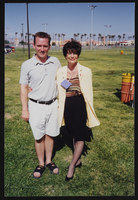Search the Special Collections and Archives Portal
Search Results
Jenkins L. Wright oral history interview
Identifier
Abstract
Oral history interview with Jenkins L. Wright conducted by Cliff Keeuer on October 06, 1973 for the Ralph Roske Oral History Project on Early Las Vegas. Wright discusses Southern Nevada and personal history. Wright also talks about the growth of casinos and gaming throughout Las Vegas.
Archival Collection
Eliot King oral history interview
Identifier
Abstract
Oral history interview with Eliot King conducted by an unknown collector on October 20, 1972 for the Ralph Roske Oral History Project on Early Las Vegas. King discusses arriving to Las Vegas, Nevada in 1942 and gives his opinions on the city as it went through changes.
Archival Collection
Robert E. Lake oral history interview
Identifier
Abstract
Oral history interview with Robert E. Lake conducted by A.D. Hopkins on September 27, 1975 for the Ralph Roske Oral History Project on Early Las Vegas. In this interview, Lake discusses how the layout of Las Vegas, Nevada has changed since he first arrived there.
Archival Collection

West Las Vegas Economic Planning Project: documents, budgets
Date
Archival Collection
Description
From the Clark County Economic Opportunity Board Records -- Series II: Projects. This folder contains documents on the West Las Vegas Economic Planning Project including topics like purpose, objectives, administration, and budgets.
Text
Las Vegas and Southern Nevada history
Level of Description
Archival Collection
Collection Name: Scott Rayer Collection of Television Programs about Las Vegas, Nevada
Box/Folder: N/A
Archival Component
Elda Ohrn oral history interview
Identifier
Abstract
Oral history interview with Elda Ohrn conducted by Joan R. Buckwalter on February 25, 1977 for the Ralph Roske Oral History Project on Early Las Vegas. In this interview, Ohrn discusses her experiences growing up in Las Vegas, Nevada during the 1930s and 1940s.
Archival Collection
Henry Zigtema oral history interview
Identifier
Abstract
Oral history interview with Henry Zigtema conducted by Cheryl Stewart on February 27, 1977 for the Ralph Roske Oral History Project on Early Las Vegas. Zigtema shares personal stories regarding his arrival to Las Vegas, Nevada in 1929, and the development of the city.
Archival Collection

Dennis McBride holding a boa constrictor at Gay Pride: photographic print
Date
Archival Collection
Description
Gay Pride 1999 at Sunset Park. Dennis McBride with boa.
Image
William H. (Bob) Bailey oral history interview
Identifier
Abstract
Oral history interview with William (Bob) Bailey conducted by Claytee White on November 19, 1997 for the African Americans in Las Vegas: a Collaborative Oral History Project. William H. “Bob” Bailey discusses how he arrived in Las Vegas, Nevada in 1955 to become the emcee at the Moulin Rouge and how he entered a black community that used his talents in the fight for equality and justice. He then discusses how the closing of the Moulin Rouge after a few months of operation propelled him into services on the Equal Rights Commission as well as a career in the television industry, ownership in several local gaming establishments, and formation of the NEDCO (Nevada Economic Development Company).
Archival Collection

Tod Story and Shelley Berkley at Gay Pride: photographic print
Date
Archival Collection
Description
Image
